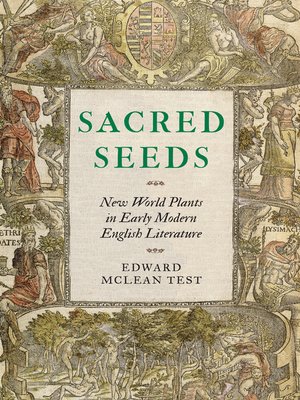Sacred Seeds
ebook ∣ New World Plants in Early Modern English Literature · Early Modern Cultural Studies
By Edward McLean Test

Sign up to save your library
With an OverDrive account, you can save your favorite libraries for at-a-glance information about availability. Find out more about OverDrive accounts.
Find this title in Libby, the library reading app by OverDrive.



Search for a digital library with this title
Title found at these libraries:
| Library Name | Distance |
|---|---|
| Loading... |
More than five hundred years after the fact, present-day writers still use hyperbolic adjectives to describe the "discovery" of the Americas. Columbus's crossing of the Atlantic—and the age of exploration that ensued—dramatically and forever changed the early modern world. The societies, economies, cultures, arts, and burgeoning sciences of Europe were quickly transformed by the ongoing encounter with the New World.
The meeting of the New and the Old Worlds, however, was more than a meeting of disparate civilizations. It was also a confluence of exciting and often surprising associations that continually created new interfaces between materials and knowledge. The Western and Eastern Hemispheres, brought together by sailing ships for the first time on a large scale, helped create the global landscape we take for granted today. Central to this formative moment in global history were New World plants. The agriculture of indigenous peoples mythically and materially shaped English society and, subsequently, its literature in new and startling ways.
Sacred Seeds examines New World plants—tobacco, amaranth, guaiacum, and the prickly pear cactus—and their associated Native myths as they moved across the Atlantic and into English literature. Edward McLean Test reinstates the contributions of indigenous peoples to European society, charting an alternative cultural history that explores the associations and assemblages of transatlantic multiplicity rather than Eurocentric homogeny.
The meeting of the New and the Old Worlds, however, was more than a meeting of disparate civilizations. It was also a confluence of exciting and often surprising associations that continually created new interfaces between materials and knowledge. The Western and Eastern Hemispheres, brought together by sailing ships for the first time on a large scale, helped create the global landscape we take for granted today. Central to this formative moment in global history were New World plants. The agriculture of indigenous peoples mythically and materially shaped English society and, subsequently, its literature in new and startling ways.
Sacred Seeds examines New World plants—tobacco, amaranth, guaiacum, and the prickly pear cactus—and their associated Native myths as they moved across the Atlantic and into English literature. Edward McLean Test reinstates the contributions of indigenous peoples to European society, charting an alternative cultural history that explores the associations and assemblages of transatlantic multiplicity rather than Eurocentric homogeny.






